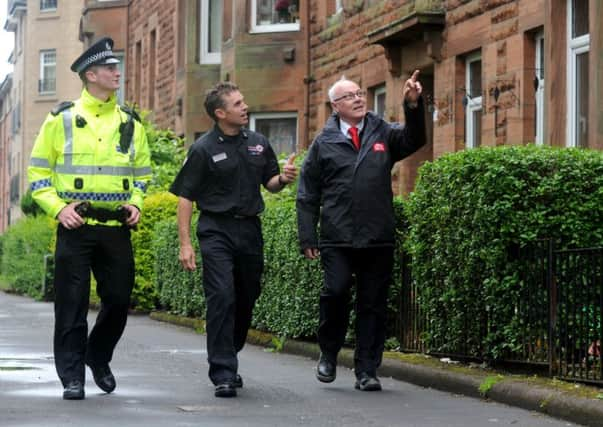Comment: Keeping watch on the neighbourhood


WE all want to walk down our street without looking over our shoulder or close our front door at night and feel safe and secure in our own home.
Tackling anti-social behaviour and crime, however, remains one of the key issues affecting societies in towns and cities across the UK.
Advertisement
Hide AdAdvertisement
Hide AdGHA, the largest social landlord within Wheatley Group, wanted to do more to tackle vandalism, violence, youth disorder and tenant vulnerability in its communities.
As part of its mission of “Better homes, better lives”, GHA set out to make communities better places to live and for residents to take a pride in their local neighbourhood.
However, this was a huge challenge to tackle alone for a registered social landlord with 41,500 homes across Glasgow. The question we asked was how do we tackle many of society’s deeper problems from a housing perspective?
This answer was the creation of the Community Improvement Partnership (CIP), comprising staff from GHA, the police and the fire service.
The partnership – the first time a Registered Social Landlord in Scotland had a police team integrated into its neighbour relations service – was initially trialled in two areas of the city before being officially launched in 2012. It had a clear and shared vision: to make communities safer.
The CIP involves 15 officers from Police Scotland seconded to GHA to work side-by-side with housing staff tackling issues that affect tenants’ lives, such as late-night parties, disorder and drug dealing. The police officers complement frontline policing and are an addition to, rather than a replacement for, officers deployed in the area.
The sharing of skills and knowledge makes the response to anti-social behaviour more effective – and the increased visibility of extra “bobbies on the beat” helps tenants in GHA neighbourhoods feel safer.
A station commander from the Scottish Fire and Rescue Service is also seconded to work with housing staff to identify and help vulnerable tenants who are at risk of fire.
Advertisement
Hide AdAdvertisement
Hide AdAlthough joint working previously existed, information passed to housing staff was not always captured or shared in the most effective way. The CIP overcame these issues.
A programme of change was introduced across GHA to create a tailored model based on the national intelligence model. The model sees information from the community collated and analysed and used to identify the issues causing most risk to residents. Resources are then tasked jointly to take action. This allows effective intervention to be made at the earliest opportunity.
A customer first approach was designed where housing staff record all potential issues they find through their own observations or discussions.
The CIP developed a dedicated intelligence unit which collated all known community information from the three organisations. The unit analyses the data, identifies the highest risks across GHA areas and produces targeted profiles to support local housing staff. Once the priorities are identified, the dedicated police team is deployed to the highest priority area and carries out a targeted eight-week operation. This approach means GHA and tenant priorities drive operational decisions.
Since its official launch, the CIP has been recognised across the UK and become the leading example for other landlords and communities. Representatives from the Home Office’s Violent and Youth Crime Prevention Unit and the Met’s Trident Gang Unit visited the headquarters in 2013 to learn how GHA is making communities safer.
Over the past year alone, the partnership has in addition to regular police patrols:
l seized almost 3.5kg of drugs, including 4,000 tablets, worth an estimated £214,000
l seized 800 litres of alcohol
l executed more than 650 warrants
l issued 530 anti-social behaviour penalty notices
l carried out 700 joint visits with GHA staff.
In addition, by identifying people whose lifestyles put them at risk of having a fire in their home, officers are helping tenants introduce ways to keep safe. This includes fire officers carrying out a home fire safety visit, giving advice about smoking, cooking and other fire risks, making sure smoke alarms are working and fitting additional smoke and heat detectors where required.
Advertisement
Hide AdAdvertisement
Hide AdSuch has been the success of the partnership, the CIP has moved into other areas of Glasgow and into neighbourhoods of Cube Housing Association, which is also part of Wheatley Group.
At a time when resources are stretched more than ever before, partnership working has never been more important. Social landlords cannot expect to solve society’s issues alone. We all have our role to play.
• Olga Clayton is director of housing and care at Wheatley Group, www.wheatley-group.com